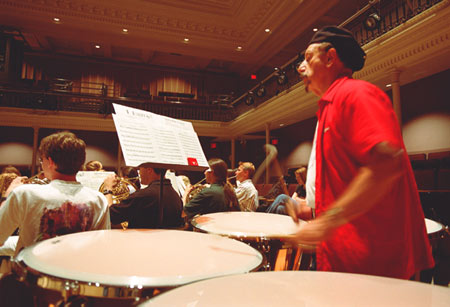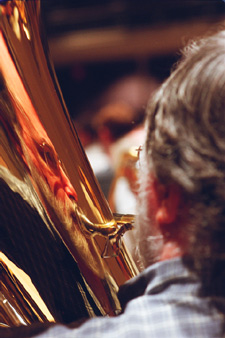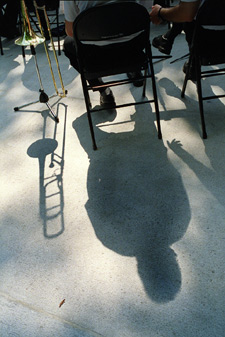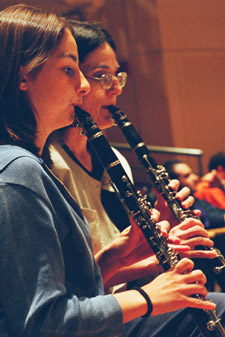No audition required
Harvard’s un-Harvard band mixes pros with amateurs

On the last afternoon in July, on the steps of the Memorial Church, Harvard Band director Thomas Everett led a rebellion of sorts.

There, before an audience sprawled across Harvard’s stately Tercentenary Theatre, Everett directed more than 100 musicians who had neither paid for nor received academic credit, nor competed, nor even auditioned for the experience. Several days later, on August 3, his anomalous band took to the Hatch Shell on Boston’s Esplanade for a concert of wind band music by John Williams, Percy Grainger, and Leroy Anderson ’29, among others.
“It’s very un-Harvard,” Everett admits of the Harvard Summer Pops Band, co-sponsored by the Harvard Summer School and the Harvard University Band. “By all rights, it shouldn’t work.”
Yet the Harvard Summer Pops Band does work; it has worked for 30 years.
Everett launched the band in 1972 to fill the summer void in the Boston area’s otherwise thriving music scene. Now, up to 150 woodwind, brass, and percussion players catch the Summer Pops Band habit each summer, making it the largest ensemble to play at the Hatch Shell every year.
“The goal is not the same as the Boston Symphony … the goal is not the same, probably, as Cambridge Rindge and Latin High School,” says Everett. Rather than perfection, the Summer Pops Band shoots to make rousing music with joy and creativity. Short of “doing bodily harm to themselves or to the ensemble,” Everett says, musicians of all stripes are encouraged to participate however they wish.
Making music, not notes
It’s a Wednesday night rehearsal in Lowell Hall, and the band has just brought Sergei Prokofiev’s “Athletic Festival March” to a triumphant close. Brass soars, percussion thunders, then – at once – silence.
“Ooh, nice,” a trombone player whispers as the ensemble sticks the ending.
Perhaps, but Everett has comments. He sings, he jokes, he waves his hand to illustrate a melodic line.

“There’s a richness of flutes here that we’re so fortunate to have,” he says, nodding to the proud and robust flute section. “We just can’t use them all at once.”
It’s classic Everett coaching: a gentle suggestion delivered with enthusiasm and plenty of humor to cushion the blow.
Strength in numbers is one way Everett and assistant director Nat Dickey coax credible performances from their un-Harvard ensemble. With more than enough instruments for any given part, less experienced musicians know that if a certain note or section or entire work is beyond their ability, someone else will carry the load.
“The first year, I just played C,” jokes saxophonist Bill Niland of Topsfield, who joined the band a decade ago with just two years of saxophone under his belt. “Gradually over the years, I built it up.”
Another Everett teaching trick, this one more subtle, is that he doesn’t designate which flute players should sit mute while their colleagues play.
“Getting people to listen to the group and make decisions on their own is a major step towards someone’s involvement in creativity,” he says. “You don’t have to play every single note perfectly, but you do have to help the music.”
‘The goal is not the same as the Boston Symphony …,’ says Everett. Rather than perfection, the Summer Pops Band shoots to make rousing music with joy and creativity. Short of ‘doing bodily harm to themselves or to the ensemble,’ Everett says, musicians of all stripes are encouraged to participate however they wish.
“Tom is just a terrific conductor,” says Morris Keesan, a veteran saxophone player from Arlington. While Keesan plays with the Metropolitan Wind Symphony (“It has somewhat higher aspirations, musically,” he says) during the year, he’s been a Summer Pops Band devotee since the 1980s.
Keesan and other seasoned players extend Everett’s teaching from the podium into the ranks, serving as informal mentors and section leaders. While newcomers are often overwhelmed, “there’s someone sitting within two seats of them who … will go over and say, ‘Hey, how are you doin’ over there?’” says Everett.
“It really is an unusual experience to play in a group this large and this motley,” says Keesan. “When it comes together, it’s magical.”
A motley mix
The Summer Pops Band thrives on its motley mix. Heads are gray or bald, pigtailed or topped with baseball caps turned youthfully backward. Along the side of Lowell Hall, vintage leather instrument cases jumble with sleek plastic ones decorated with rock band stickers.

For some, like mother and daughter clarinetists Linda and Jennifer Grant, the band is a family affair. Like many former high school musicians, Linda Grant, managing editor of Harvard Law Bulletin, abandoned her clarinet around the same time she packed away her yearbooks. But when her daughter, Jennifer, took up the instrument six years ago, Linda’s interest rekindled.
Last year, the senior Grant worked up the courage to join the Summer Pops Band; this year, Jennifer, now 15 and a member of the Watertown High School band, joined her.
“It’s a fun night out for us,” says Linda.
At 86, trombonist Heustis Purdy guesses he’s the band’s senior member, at least in age. A retired silversmith, he bought a trombone and instruction book 15 years ago at a flea market; he’s been in the band for the past three years, carpooling from his home in Newbury with saxophonist Niland.
“It’s good for me,” he says, joking with Niland that his progress quickened when he realized his flea market book promised a tune, not a tone, a day.
“I’m still learning,” says Purdy. “That’s why I keep coming.”




